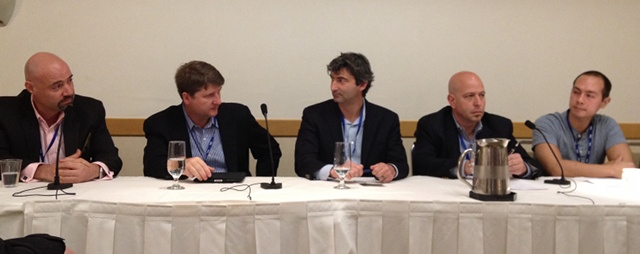Want smarter insights in your inbox? Sign up for our weekly newsletters to get only what matters to enterprise AI, data, and security leaders. Subscribe Now
Tacking “software-defined” in front of your product description is like wearing a tight red dress — a sure way to get attention. That doesn’t mean there is no substance underneath, however, and today yet another “software-defined something” startup demonstrated the appeal of this technology.
Software-defined storage startup Scality has raised $22 million in a third round of funding, led by Menlo Ventures.
Scality’s system provides petabyte-scale storage. Its flagship product, Scality RING, turns sets of generic servers into a storage platform using a “distributed, shared-nothing architecture.” The software can run on any commodity server hardware and has solutions for file access, sharing, and distribution. Companies can use it to better manage storage for applications in a virtualized data center.
“Our disruption is to be able to deliver comparable performance and even better ease of management in a completely software based solution,” Scality’s founder and CEO Jerome Lecat told VentureBeat. “What is exceptional is that our system always balances for performance and takes cares of failures in the background, without requiring any human intervention.”
Traditionally storage is sold in the form of hardware through vendors like EMC, Netapp, or HDS. The hardware, software, and management systems are expensive and costly to maintain, and as businesses with large storage needs face rising costs. Software-defined storage distributes this data over multiple hard drives and computers, which provides increased flexibility and performance.
The “old, siloed paradigm of a dedicated storage for each application is dead,” Lecat said. What today’s companies need, in this era of rapidly proliferating data, is a storage pool that can easily scale and perform well, at a reduced cost. However many organizations are still skeptical of software-defined data centers.
“Growing a startup is about convincing the world that you can do something for them by changing something,” he said. “But most people hate change, so it is very difficult to get people to adopt the new way of doing things until there is peer pressure. It is no different with Scality than with other startups. This funding, and our recent customer growth, is a significant milestone, because it shows that we are becoming mainstream and acceptable.”
Skepticism aside, investors are excited about the opportunities here. Lecat said that the storage market is about $100 billion and “software-defined” startups are raising money left and right. VMware acquired Nicira for $1.26 billion in 2012, and Nexenta closed a $24 million funding round earlier this year. In 2012, Michael Dell launched a $60 million fund for early stage storage companies, betting that this sector would fuel some of the most important strides in IT in the next decade. Dell has also been on an acquiring frenzy, scooping up more than 25 young storage companies in the past five years.
Scality launched in 2009 and has developed and deployed software storage solutions that deliver billions of files to tens of millions of users each day. Its customer list includes four of the top 10 cable operators in the U.S. and leading telecom companies in France, Italy, Germany, and the UK. It offers solutions for government, enterprise, media and entertainment, high performance computing, and email service providers. Its sales are growing by five times annually.
Menlo Ventures led this round along with Iris Capital, with participation from FSN PME and all existing investors including Idinvest Partners, OMNES Capital, and Galileo Partners. Lecat met Doug Carlise, who led Menlo’s investment, at VentureBeat’s CloudBeat conference.
Lecat also met Ben Revcolevschi, the senior vice president of services and cloud at French telecom carrier SFR, at CloudBeat which led to another fruitful interaction. Revcolevshi attended CloudBeat in 2011 with the mission of finding partners to create a new cloud business (called Numergy) that would provide infrastructure-as-a-service and platform-as-a-service to French and greater European companies. The idea for Numergy emerged out of SFR’s “the “chocolate factory.” The chocolate factory was the name for the workspace inside the telecom giant where the team gathered around a big table filled with chocolate candy to brainstorm and collaborate. Numergy has since raised $300 million from the French state and is targeting $400 million in revenues.
This round brings Scality’s total capital raised to $35 million. It has offices in San Francisco, Paris, New York, Washington DC, and Tokyo.


